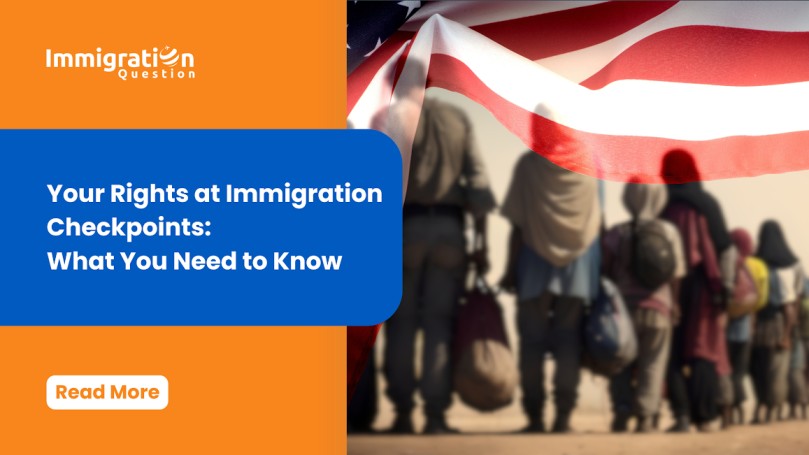Introduction
There are several reasons why you should know your rights at immigration checkpoints. Firstly, knowing your rights can empower you to make well-informed decisions and safeguard your personal freedoms. By comprehending what immigration officers can or cannot do, you can avoid self-incrimination and unwarranted searches.
Secondly, knowledge of your rights reduces any potential abuse of power by immigration authorities in their line of duty. Sometimes, immigration officers may go beyond the limits that they are permitted; knowing your rights will help you identify when such situations occur and enable you to respond accordingly.
Thirdly, being able to comprehend these rights can reduce the level of stress and anxiety one experiences during encounters with an immigration officer. It further provides a sense of clarity and confidence that allows you to handle the interactions calmly and effectively.
There are different kinds of immigration checkpoints and each one has specific rules and procedures peculiar to it. Airports have customs and border protection (CBP) officers who inspect international travelers, checking their passports, visas, or any other travel documents that they may have been issued. Border crossings are a country’s physical entry and exit points for land travelers, also usually monitored by CBP agents. Internal checkpoints are located within 100 miles of any U.S border and typically have border patrol agents stopping vehicles to ascertain the occupants’ immigration status. Knowing the difference between each of these checkpoints, together with the procedures at each can help you better prepare for encounters with immigration authorities.
Get expert guidance on knowing your rights at immigration checkpoints. Or simply ask your immigration checkpoints questions.
Understanding Immigration Checkpoint Questions
-
What Are Immigration Checkpoints?
Immigration checkpoints are designated places where immigration officers legally stop and search people in order to enforce migration laws. These checkpoints have a number of purposes including ensuring adherence to immigration laws, keeping border security, preventing illegal entry into the country as well as identifying and arresting individuals involved in criminal activities.
Usually, most of these checkpoints are located near United States borders, especially along the U.S.-Mexico boundary or within 100 miles from every international border or coastline around the U.S. This area is referred to as “border zone” since it comes under extended authority of the Border Patrol.
-
Who Can Be Stopped and Questioned?
Those who can be stopped and questioned include U.S. citizens as well as those who live here on a legal basis. While it is not a requirement for citizens to carry proof of citizenship all the time, producing it could make the verification process easier. Keep in mind that if these agents are going to do more incursive “searches” or detain an individual at any checkpoint, they must have suspected this person did something illegal concerning immigration.
Connect with attorneys at immigrationquestion.com to get a better understanding of immigration checkpoints.
Your rights at Immigration Checkpoint Questions
It is important that you know your legal rights before approaching any immigration checkpoint. Below are some of these rights:
-
The right to remain quiet
While you do have a right to be quiet, it helps to understand when and how you can take advantage of this right.
- General principle: You have the right to say nothing, so no one should force you into answering any immigration checkpoints questions that may incriminate you.
- At immigration checkpoints: This is a bit more complicated. Usually, though, your personality and travel plans are considered basic and must be answered.
- Invoking the rights: If you do not want to answer certain immigration checkpoints questions, politely state this. Note however that refusing to answer questions about who you are, where you have traveled previously or other standard immigration checkpoints questions could lead to further inquiry or delay.
- Consequences: While fines may be absent for choosing this course of action, suspicion may be raised leading to more inquiries or detention.
- The right to legal representation
When can you get a lawyer? | Immigration Checkpoint Questions
- At the Border: Right to an attorney may be limited. In some countries, there is no entitlement to legal representation. The U.S., offers this right but with certain limitations.
- Conditions of detention: If you are detained or dealing with grave circumstances (such as being prosecuted out-of-state), you will be allowed this right.
- Protection against unreasonable searches and seizures
Your Rights regarding your properties.
- Belongings and Personal Items: Immigration officials generally have broad authority to search your belongings without a warrant. This includes luggage, bags and other personal effects.
- Electronic Devices: Searching electronic devices such as smartphones and laptops is a growing area of the law. Some states allow more searches, while others may have more restrictions.
Physical examination.
- Pat-Downs and Personal Searches: Pat-downs and special frisk searches are generally authorized. However, more intrusive searches (such as strip searches) often require a higher level of justification.
- Rights relating to presentation of documents and identification
What are you legally required to provide?
- Passport and Visa: A valid passport and visa (if applicable) must be presented at the time of entry. Failure to provide these may result in denial of access.
- Other Documents: Depending on the country, you may need to provide additional documentation such as return tickets, proof of funds, or specific entry permits.
Consequences of refusing to submit documents
- Refusal of Entry: Refusal to provide required documentation or information may result in refusal of entry into the country.
- Detention or Fines: In some cases, refusal may result in imprisonment, fines, or other penalties according to the law.
Get a better understanding of your rights at immigration checkpoints by speaking with an Immigration Question attorney today.
How to Interact with Immigration Officers – Immigration Checkpoint Questions
-
Staying Calm and Respectful
The first thing to do when dealing with immigration officers is to maintain a calm and respectful demeanor. In this case, staying cool-headed enables an individual to think straight and communicate effectively. This reduces the chances of any misunderstandings occurring. Respectful communication such as using polite language and attentive listening to the instructions given by the officer is indicative that you are ready to cooperate and follow due process.
-
Asking for Clarification
When you are unsure of something or need more information regarding a procedure or your rights, it is important that you politely ask for clarification. For instance, you could say: “Could you please clarify?” Or “I have not understood what you said. Can you repeat it once more?” On the other hand, you can ask questions like ‘could I know more about this?’ or ‘what exactly can I do in this situation?’ in order to obtain required information without causing any unnecessary tension. It is also helpful if one’s requests are brief and precise so as to ensure that effective communication takes place.
-
Handling Requests for Information or Documents
When responding to queries from the immigration authorities about needed documents, it is best to be prepared and organized. Keep all essential papers including passport and visa at hand. Answer questions honestly and give out only the necessary information as requested.
It is important for you to know your rights. In the event that you find yourself unsure if you have to answer a question or divulge specific information, just ask yourself questions, like “Should I respond?” or “Do I need to mention this information?” Should there be an inquiry that makes you feel uneasy, keeping calm and politely seeking answers as to why that information is needed may assist. This approach helps ensure smooth and professional interactions.
Consult with an immigration attorney at immigrationquestion.com for personalized guidance and tips on interacting with immigration officers.
What to do if your rights are violated
-
Document the Incident
- Write down all facts immediately: Quickly write down the facts, including the names of everyone involved or an those who witnessed the event. Also write down the date, time and place.
- Hold on to Physical Evidence: Whenever possible, keep any physical items like documents, clothes or anything related to the incident.
- Gather E-Documents: Save necessary emails, messages or records. Ensure pictures or videos are safe.
- Keep a Diary: Keep an updated record of developments including engaging with authorities or other bodies involved.
-
Report the Incident and File a Complaint with Appropriate Authorities or Organizations
- Find the Right Regulator: Depending on what has been done wrong this could either mean a governmental institution, regulatory body, human rights organization among others.
- Put in Writing a Formal Complaint: Submit a comprehensive report concerning the matter with all the evidence gathered so far using the official form provided by the organization.
- Follow Up Actions: Have your conversations noted down and if after sometime no action is taken, make sure you get back to them in due course.
- Advocacy Search: Consider reaching out to organizations that focus on the protection of rights, like civil liberties groups or legal aid societies, which could provide further assistance or advice.
-
Legal Assistance
- Evaluate Requirement for Attorney: In case the violation is tangled in legal matters, possible criminal charges, or has far reaching personal effects, then it is essential to seek legal representation. You can find seasoned immigration lawyers at immigrationquestion.com.
- Identify a Competent Lawyer: You may want to look for an attorney who specializes in immigration law or a particular area related to your situation. Lawyers at Immigration Question are perfect for this.
- Getting Ready for Consultation: Take along any documents and evidence you have relating to your case and be prepared to talk extensively about what happened.
- Know Your Rights And Options: Knowledgeable attorneys can brief you on where you stand legally, remedies available (if any) as well as the most appropriate course of action available to you in such cases including representing you in court if necessary.
Conclusion – Immigration Checkpoint Questions
The knowledge of your rights at immigration check points is important for you to ensure fairness and safeguard your legal rights. Here’s a quick rundown of of how to approach immigration checkpoints questions and any other interactions at Immigration checkpoints:
- Know Your Rights: Familiarize yourself with what constitutes search, questioning or detention on your part. Such knowledge will give you confidence when dealing with immigration officers.
- Be Informed: Regularly update yourself about any changes in immigration laws and regulations that might affect your rights as well as obligations.
- Be Assertive: Respectfully stand for your rights when dealing with the authorities. Ask for clarification if there is something that appears strange to you regarding the procedures followed.
- Documentation: Ensure that relevant papers such as immigration paperwork and identification are well arranged and kept within easy reach to facilitate fluid interaction at checkpoints.
Extra Resources – Immigration Checkpoint Questions
Here are some useful sources of information:
- Legal Aid Organizations:
- American Civil Liberties Union (ACLU)
- Immigrant Legal Resource Center (ILRC)
- National Immigration Law Center (NILC)
- Government Websites:
- U.S. Citizenship and Immigration Services (USCIS)
- U.S. Customs and Border Protection (CBP)
- Department of Homeland Security (DHS)
- Educational Materials: Know Your Rights brochures and videos, often available through the above organizations’ websites.
Report Abuses and Ask for Additional Help
If you face problems or maltreatments at the immigration check points, you can contact/report to any of these places:
- ACLU’s Border Rights Project: (ACLU Reporting Tool)
- Immigration and Customs Enforcement (ICE) Community Hotline: 1-888-351-4024
- CBP INFO Center: [CBP Contact Form]
Keeping yourself updated and ready can make a huge difference when you come across immigration checkpoints. By being aware of your rights and where to get assistance, you can protect yourself and your family.
Frequently Asked Questions – Immigration Checkpoint Questions
-
What are immigration checkpoints?
Immigration checkpoints are places or spots where immigration officers stop people to check their immigration papers, usually at international boundaries, airports and some other points in the U.S. near the border.
-
What to bring along to an immigration checkpoint?
U.S. citizens should bear proof of citizenship like a passport or state issued I.D. Non-citizens will need to carry on them any documents that show their legal status such as green card, visa or employment authorization document (EAD).
-
Do I have to respond to questions asked by immigration officers?
You can remain silent. U.S. citizens may choose to give their names and provide proof of citizenship. On the other hand, non-citizens can choose whether or not to answer any questions related to their status as long as they carry their immigration documents.
-
Can immigration officers search my possessions?
Yes. At international borders and checkpoints, immigration officers have broad powers of search over personal property without needing a search warrant or having probable cause.
-
Can I refuse a search at an immigration checkpoint?
In the case of international borders and airports, this is not advisable as officials are legally allowed to conduct searches even if there is no permission from the travelers.











